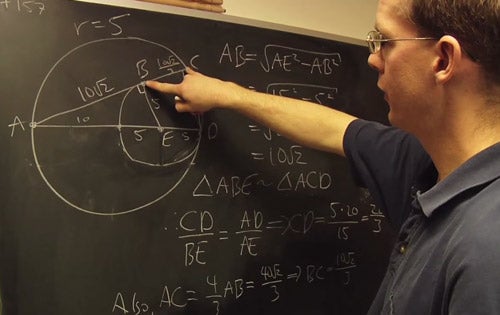
Waterloo math lecturer wins national teaching award
Ian VanderBurgh, winner of the 2016 Canadian Mathematical Society’s Excellence in Teaching Award, is honoured for innovative teaching

Ian VanderBurgh, winner of the 2016 Canadian Mathematical Society’s Excellence in Teaching Award, is honoured for innovative teaching
By Staff University Relations
Ian VanderBurgh, a lecturer in the University of Waterloo’s Faculty of Mathematics, has won the prestigious 2016 Canadian Mathematical Society (CMS) Excellence in Teaching Award for "sustained and distinguished contributions” at the post-secondary undergraduate level.
"Ian joins an elite group of math educators," says Serge D'Alessio, associate dean of undergraduate admissions and outreach in Waterloo’s Faculty of Mathematics.
The CMS noted that VanderBurgh, whose “reputation and popularity are legendary,” influences both students and teachers. He inspires struggling students as well as some of the best math students in Canada who study at Waterloo’s globally ranked Faculty of Mathematics.
A formal CMS statement noted:
“VanderBurgh understands students’ needs and knows where and when they will have difficulties with the material. He carefully prepares and presents material in a way that is easy to understand, with motivating examples and insightful observations."
Outside the lecture hall, VanderBurgh is the director of Waterloo’s Centre for Education in Mathematics and Computing (CEMC), a group that has led numerous initiatives to promote mathematics including contests, high school visits, student and teacher workshops, online resources and, most recently, free online courseware in computer science and programming as well as Grade 12 mathematics.
One of the members of the CMS Teaching Award Selection Committee wrote of VanderBurgh:
“For me, the most impressive part of Ian's nomination was the wide range of his contributions to mathematical education at the University of Waterloo, but also nationally and internationally. It seems to me that with math contests, articles in Crux, and his involvement in the master’s program for teachers, Ian has reached out to learners in all corners of Canada and the world.”
One student wrote:
"I struggled through my first year of university, and by the time I found myself in Mr. VanderBurgh’s course, I had accepted that university mathematics was going to be difficult for me. All of that changed in Mr. VanderBurgh’s lecture hall. His enthusiasm for the subject matter was contagious and he was always able to explain concepts in another way if I was having difficulty. . . I finished his course with a confidence I hadn’t yet felt in university, and I was enjoying the mathematics again!”
“His passion for the abstract beauty of mathematics made me fall in love with it too, and his clarity and intuition for the subject made me see past the formulas and notation to the real core of the subject.”
VanderBurgh earned his Bachelor of Mathematics at University of Waterloo in 1999 and his Master of Sciences at University of Toronto in 2000. He joined the Faculty of Mathematics at University of Waterloo as a lecturer in 2000. During his tenure as the CEMC Director, VanderBurgh won several teaching awards including Faculty of Mathematics Award for Distinction in Teaching (2007), and University of Waterloo Distinguished Teacher Award (2008).
The CMS, which was founded in 1945, promotes the advancement, discovery, learning and application of mathematics. The teaching award was established in 2004. Brian Forrest, a professor in Waterloo’s Faculty of Mathematics, won the CMS teaching award in 2007.

Read more
Here are the people and events behind some of this year’s most compelling Waterloo stories

Read more
Meet the 14 exceptional students representing Waterloo’s newest grads

Read more
Meet the five exceptional graduate students taking the convocation stage as Class of 2024 valedictorians
The University of Waterloo acknowledges that much of our work takes place on the traditional territory of the Neutral, Anishinaabeg, and Haudenosaunee peoples. Our main campus is situated on the Haldimand Tract, the land granted to the Six Nations that includes six miles on each side of the Grand River. Our active work toward reconciliation takes place across our campuses through research, learning, teaching, and community building, and is co-ordinated within the Office of Indigenous Relations.